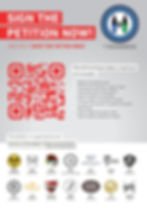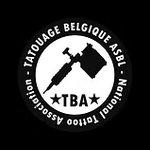à partager - Lettre au gouvernement belge sur l'interdiction des encres 4-01-2022 -FR-EN version
FR
Chères représentants,
en tant qu'associations professionnelles des tatoueurs, nous sollicitons votre aimable attention pour des éclaircissements sur le nouveau règlement REACH-2022 qui modifie les règles d'utilisation des pigments pour le tatouage et la dermopigmentation. Avec ATB (ASBL Tatouage Belgique) nous sommes engagés depuis plus d'un an sur ce front, tant au niveau national qu'européen, en nous comparant avec les associations professionnelles de toute l'Europe et aussi avec les Institutions promouvant le nouveau règlement. Ceci est possible grâce au CETA (Council of European Tattoo Association) dont notre président est le fondateur. Le CETA a été créé dans le but de clarifier et de promouvoir la bonne information sur cette nouvelle loi qui inquiète les professionnels à travers l'Europe, promouvant également la pétition "Save the pigments" actuellement active via le canal "Pétitions du Parlement européen". (ci- dessous le lien pour plus d'informations - https://www.savethepigments.com/en/)
Comme prévu, il y a malheureusement beaucoup de confusion à cet égard et chaque pays membres européens réagit avec cette loi de différentes manières, à la fois en termes de compréhension et d'applicabilité. Les producteurs eux- mêmes ont de sérieuses difficultés à créer des produits conformes à la nouvelle réglementation, en raison des nombreuses divergences dans la loi elle-même et du problème de pandémie de Covid-19 qui n'a pas donné aux fabricants le temps nécessaire pour s'adapter en ce sens, ne pouvant faire tous les tests nécessaires dans les délais requis. Etant entendu que la nouvelle loi repose majoritairement sur un principe de précaution et non sur une base scientifique solide (notamment pour les pigments Blue 15 et Green 7 qui seront interdits à partir de 2023 et non à partir de 2022).
Ces affirmations sont appuyées par des experts, notamment des chimistes, des ingénieurs, des médecins et des dermatologues, certains du CETA et de l'ESTP (European Society of Tattoo and Pigments Research - https://estpresearch.org) et par l'organisme de réglementation REACH lui-même qui admet qu'il n'a aucune preuve de la dangerosité de ces deux pigments en particulier mais seulement des suppositions, cependant insuffisantes, à notre avis, pour justifier une réglementation de cette ampleur. Malheureusement, force est de constater que la rédaction de cette nouvelle loi s'est déroulée sans que l'industrie du tatouage n'ait été consultée, aucune association professionnelle, aucun expert de l'industrie, aucun détaillant de matériel et surtout aucun fabricant d'encre de tatouage n'a été contacté pour une comparaison pratique. De plus, étant donné que notre catégorie a annoncé cette nouvelle loi indirectement et non par des canaux officiels tels que le ministère de la Santé ou les autorités sanitaires, il est facile de comprendre à quel point l'année à venir sera extrêmement déroutante pour notre catégorie.
Nous tenons également à préciser que nous, en tant qu'associations professionnelles, sommes absolument favorables à des lois visant à mettre le consommateur en sécurité et nous rappelons qu'au fil du temps notre catégorie s'est autorégulée sur divers aspects, notamment la santé et l'hygiène, avant même qu’elles aient été régies par des lois spécifiques. Cependant, nous pensons que certains aspects de cette loi ne sont pas équilibrés, risquant un retour massif à l’illégalité, y compris même dans un scénario qui n'est pas si improbable qui conduirait certains tatoueurs à autoproduire des mélanges potentiellement dangereux, aspects auxquels nous sommes confrontés au quotidien et pour lesquels les autorités compétentes ne peuvent rien faire faute certainement de moyen. Nous avons largement prédit que la conséquence de tout cela aurait un effet en cascade qui risquerait de peser sur la santé des consommateurs, sur le système de santé de l'État, sur l'économie de milliers de travailleurs du secteur et sur les recettes fiscales de l'État, problèmes que nous sommes sûrs que les institutions n'ont pas besoin en ce moment de crise sanitaire et économique due à la pandémie de COVID-19. Par conséquent, nous vous demandons par la présente comment la nouvelle réglementation sera appliquée sur le territoire national.
● Quelles seront les conditions d'utilisation des produits actuellement stockés dans les studios ?
● Comment seront effectués les contrôles ?
● Quelles sont précisément les substances qui ne peuvent plus être utilisées ?
Ces réponses sont fondamentales pour notre catégorie. En raison du manque de communication concernant cette nouvelle loi, de nombreux tatoueurs ignorent encore les changements substantiels envisagés et s'exposeront à des sanctions bien qu'ils travaillent de bonne foi et dans les termes de la loi actuellement en vigueur. Nous sommes à votre entière disposition, et en effet nous serons heureux de collaborer avec les autorités compétentes, pour une comparaison ou une table de discussion étant donné qu'au sein de notre association et surtout au sein du CETA nous avons des personnalités ayant une expérience spécifique dans le domaine. Nous vous prions donc de bien vouloir nous répondre rapidement avant l'entrée en vigueur de la loi qui pour rappel s’applique dès le 04 janvier 2022.
Bruno Menei
President ATB - ASBL Tatouage Belgique
Contacts : Info@tatouagebelgique.org
0032 (0) 494/ 49.69.79
------------------------------------------------------------------------------------------------------------------------------------------------------
EN
Dear representatives,
as professional associations of tattoo artists, we ask your kind attention for clarification on the new REACH-2022 regulation which modifies the rules for the use of pigments for tattooing and dermopigmentation. With ATB (ASBL Tattoo Belgium) we have been engaged for more than a year on this front, both at national and European level, by comparing ourselves with professional associations from all over Europe and also with the Institutions promoting the new regulation. This is possible thanks to the CETA (Council of European Tattoo Association) of which our president is one of the founder. CETA was created with the aim of clarifying and promoting the right information on this new law which worries professionals across Europe, also promoting the “Save the pigments” petition currently active via the “European Parliament Petitions” channel. . (below link for more information - https://www.savethepigments.com/en/)
As expected, there is unfortunately a lot of confusion in this regard and each European member country reacts with this law in different ways, both in terms of understanding and enforceability. Producers themselves are having serious difficulties creating products that comply with the new regulations, due to the many discrepancies in the law itself and the issue of the Covid-19 pandemic which has not given manufacturers the necessary time. to adapt in this sense, not being able to do all the necessary tests within the required timeframe. It being understood that the new law is based mainly on a precautionary principle and not on a solid scientific basis (in particular for the Blue 15 and Green 7 pigments which will be banned from 2023 and not from 2022).
These claims are supported by experts including chemists, engineers, doctors and dermatologists, some from CETA and ESTP (European Society of Tattoo and Pigments Research - https://estpresearch.org) and by the REACH regulator itself which admits that it has no proof of the dangerousness of these two pigments in particular but only assumptions, however insufficient, in our opinion, to justify a regulation of this magnitude. Unfortunately, it is clear that the drafting of this new law took place without the tattoo industry having been consulted, any professional association, any industry expert, any retailer of equipment and especially no manufacturer of the tattoo. The tattoo ink was only contacted for a practical comparison. Also, given that our category announced this new law indirectly and not through official channels such as the Ministry of Health or health authorities, it is easy to understand how extremely confusing the coming year will be for our. category.
We would also like to point out that we, as professional associations, are absolutely in favor of laws aimed at making the consumer safe and we recall that over time our category has self-regulated on various aspects, in particular health. and hygiene, even before they were regulated by specific laws. However, we believe that certain aspects of this law are not balanced, risking a massive return to illegality, including even in a scenario which is not so improbable which would lead some tattoo artists to self-produce potentially dangerous mixtures, aspects to which we are confronted on a daily basis and for which the competent authorities can do nothing for lack of means. We have widely predicted that the consequence of all of this would have a cascading effect that could weigh on the health of consumers, the state health system, the economy of thousands of workers in the sector, and tax revenues. state, issues that we are sure institutions do not need at this time of health and economic crisis due to the COVID-19 pandemic. Therefore, we hereby ask you how the new regulations will be applied in the national territory.
● What will be the conditions of use of the products currently stored in the studios?
● How will the checks be carried out?
● What precisely are the substances that can no longer be used?
These answers are fundamental for our category. Due to the lack of communication regarding this new law, many tattoo artists are still unaware of the substantial changes being considered and will face penalties despite working in good faith and within the terms of the law currently in force.
We are at your entire disposal, and indeed we will be open to collaborate with the competent authorities, for a comparison or a discussion table given that within our association and especially with CETA where we have personalities with experience specific in the field.
We therefore ask you to respond quickly before the entry into force of the law which, as a reminder, applies from 04 January 2022.
Gwenaëlle Réaume
Secretary
ATB - ASBL Tattoo Belgium
CETA - Council of the European Tattoo Association
Contacts:
Info@tatouagebelgique.org
0032 (0) 494 / 49.69.79






